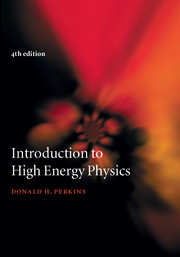Book contents
- Frontmatter
- Contents
- Preface
- 1 Quarks and leptons
- 2 Interactions and fields
- 3 Invariance principles and conservation laws
- 4 Quarks in hadrons
- 5 Lepton and quark scattering
- 6 Quark interactions and QCD
- 7 Weak interactions
- 8 Electroweak interactions and the Standard Model
- 9 Physics beyond the Standard Model
- 10 Particle physics and cosmology
- 11 Experimental methods
- Appendix A Table of elementary particles
- Appendix B Milestones in particle physics
- Appendix C Clebsch–Gordan coefficients and d-functions
- Appendix D Spherical harmonics, d-functions and Clebsch–Gordan coefficients
- Appendix E Relativistic normalisation of cross-sections and decay rates
- Glossary
- Answers to problems
- Bibliography
- References
- Index
1 - Quarks and leptons
Published online by Cambridge University Press: 05 June 2012
- Frontmatter
- Contents
- Preface
- 1 Quarks and leptons
- 2 Interactions and fields
- 3 Invariance principles and conservation laws
- 4 Quarks in hadrons
- 5 Lepton and quark scattering
- 6 Quark interactions and QCD
- 7 Weak interactions
- 8 Electroweak interactions and the Standard Model
- 9 Physics beyond the Standard Model
- 10 Particle physics and cosmology
- 11 Experimental methods
- Appendix A Table of elementary particles
- Appendix B Milestones in particle physics
- Appendix C Clebsch–Gordan coefficients and d-functions
- Appendix D Spherical harmonics, d-functions and Clebsch–Gordan coefficients
- Appendix E Relativistic normalisation of cross-sections and decay rates
- Glossary
- Answers to problems
- Bibliography
- References
- Index
Summary
Preamble
The subject of elementary particle physics may be said to have begun with the discovery of the electron 100 years ago. In the following 50 years, one new particle after another was discovered, mostly as a result of experiments with cosmic rays, the only source of very high energy particles then available. However, the subject really blossomed after 1950, following the discovery of new elementary particles in cosmic rays; this stimulated the development of high energy accelerators, providing intense and controlled beams of known energy that were finally to reveal the quark substructure of matter and put the subject on a sound quantitative basis.
Why high energies?
Particle physics deals with the study of the elementary constituents of matter. The word ‘elementary’ is used in the sense that such particles have no known structure, i.e. they are pointlike. How pointlike is pointlike? This depends on the spatial resolution of the ‘probe’ used to investigate possible structure. The resolution is Δr if two points in an object can just be resolved as separate when they are a distance Δr apart. Assuming the probing beam itself consists of pointlike particles, the resolution is limited by the de Broglie wavelength of these particles, which is λ = h/p where p is the beam momentum and h is Planck's constant. Thus beams of high momentum have short wavelengths and can have high resolution.
- Type
- Chapter
- Information
- Introduction to High Energy Physics , pp. 1 - 34Publisher: Cambridge University PressPrint publication year: 2000



